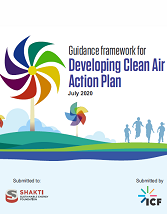
Undertaken By: ICF Consulting India Pvt. Ltd., Recent Publication: 2020
Rapid growth in energy, transport, and manufacturing sectors, combined with increasing urbanization, has had an adverse impact on air quality. The Government of India has taken a significant step by notifying the National Clean Air Programme (NCAP) which targets reduction in particulate emission by 20-30% by 2024, over 2017 level, in all the 122 non-attainment cities identified under NCAP. Along with the development of city-specific action plans, NCAP also requires development of state action plans. It intends to expand the national air quality monitoring network, build capacity for air pollution management and strengthen public awareness about the hazards of air pollution. Besides, in response to deteriorating air quality in their vicinity, several cities have started to submit air quality action plans without clearly identifying sources of regional air pollution, or specifying a reduction target for specific pollutants.
To develop a city-specific scientific evidence-based action plan, stakeholders must adopt a standardized process. Guiding frameworks and toolkits like this one can be utilised by cities while they prepare or update their action plans.